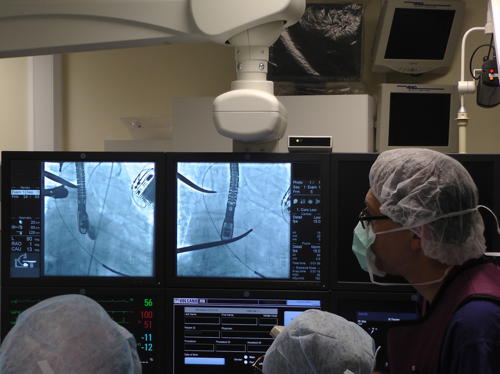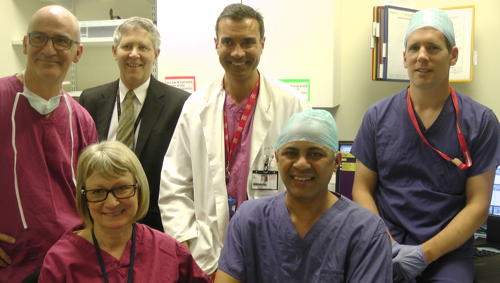World-first heart operation at St Thomas' Hospital
Patients too ill to survive lifesaving open heart surgery have been given a lifeline as doctors at St Thomas' Hospital have used new technology to complete a mitral heart valve replacement on a beating heart for the first time.


The heart team at St Thomas' Hospital performed three transcatheter mitral heart valve implants in February and early March. This is an operation carried out under general anaesthetic in which the heart's damaged mitral valve is replaced with an artificial valve.
Surgeons are able to use keyhole surgery through a tiny opening in the chest, directly into the beating heart, rather than open heart surgery. The keyhole surgery takes less than half the time, with the last procedure being done in just over half an hour.
The mitral valve separates the collecting and pumping chambers on the left side of the heart, making sure blood flows in one direction.
A leaking mitral valve causes flooding of the lungs and heart failure. If left untreated it results in irreversible damage to the heart and premature death.
Before this breakthrough, the valve could only be replaced with open heart surgery that involves stopping the heart and placing the patient on a heart-lung machine. The sickest heart disease patients are deemed too high risk for this operation and have no hope of a cure.
Mr Vinnie Bapat, Dr Martyn Thomas, Dr Jane Hancock and Dr Ronak Rajani performed the procedures with their team at St Thomas' Hospital.
Cardiac surgeon Mr Bapat said: "Until now the only way to replace a mitral heart valve was open heart surgery. If patients are too ill to undergo this surgery, nothing can be done apart from managing their condition with medication.
"Being able to replace the mitral heart valve without open heart surgery will give our sickest patients a chance of survival and a better quality of life."
By using ultrasound and X-ray guidance technology, the team was able to see inside the patients' hearts and perform the procedure while they watched on a large screen.
"Transcatheter implants have been performed to treat damaged aortic valves for many years, but the mitral valve is considered much more complex and technically challenging", added Mr Bapat.
"We've demonstrated that this procedure is feasible and in future can save the lives of similar patients in the UK and around the world.
"At this early stage we are pleased with the initial recovery of these patients. We will closely monitor their progress and improvements in their quality of life."
The world renowned heart team at St Thomas' was able to perform the operations because of their experience in complex transcatheter heart valve procedures.
The procedures were approved on compassionate grounds by the Medicines and Healthcare Regulatory Agency.
Dr Martyn Thomas, clinical director of cardiovascular services at Guy's and St Thomas' NHS Foundation Trust, said: "We're lucky to work in a health system that gives us the opportunity to pioneer lifesaving treatments like this. We're also lucky to work for a trust that is so supportive of our work."
Dr Ian Abbs, medical director of Guy's and St Thomas', said: "This development in cardiac surgery is a huge step forward for the UK, proving our position at the forefront of medical research and development to improve the care and save the lives of patients."
Comments
Share
The SE1 website is supported by people like you
More to read
- Bermondsey Yards: 11-storey block and warehouse extension approved 24 Apr 2023
- Boris aide: Covid Memorial Wall created by 'left-wing activists' 3 Mar 2023
- Thomas Guy statue: Historic England backs charity's plans 22 Feb 2023
- Royal Street: big development next to Archbishop's Park approved 13 Dec 2022
- Guy’s Cancer Centre: cladding removed five years after concerns raised 6 Nov 2022
- Thomas Guy statue uncovered for first time in two years 6 Nov 2022
- St Thomas' plans Southwark Bridge Road clinic to clear A&E space 5 Oct 2022
- Routemaster buses return to South Bank on new daily service 5 Oct 2022
- St Thomas' Hospital puts up tent for patients to queue for A&E 26 Mar 2022
- Captain Bligh's tomb: Lambeth asks for views on slavery link 26 Mar 2022
Follow us
Email newsletter
For the latest local news and events direct to your inbox every Monday, you need our weekly email newsletter SE1 Direct.

